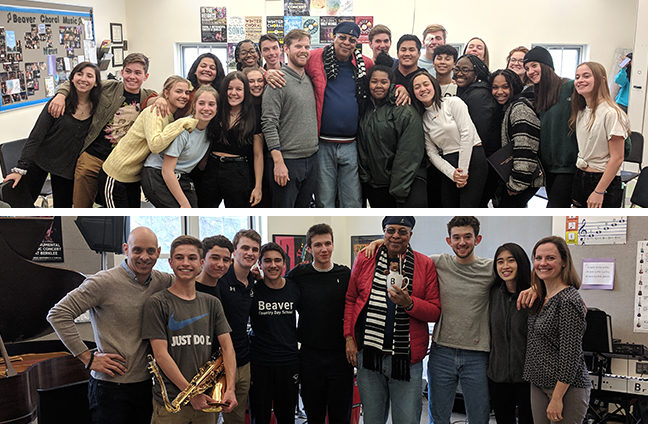World-renowned Cuban pianist, composer, and arranger Chucho Valdés visited campus today to talk with the Cuban Jazz Ensemble and Select Singers students and share his story, process, and advice. A six-time Grammy and four-time Latin Grammy winner, Valdés — founder of the band Irakere — is currently the 2019 Jazz Master in Residence at Harvard University.
Select Singers performed two songs — Bring Me Little Water Sylvie by Huddie Ledbetter, arr. Moira Smiley, and Si tu Supieras by Emilio Grenet. Upon hearing the performances, Valdés told the students, “Your Spanish is perfect and you were perfectly in tune!” Then the Cuban Jazz Ensemble played Danzón For My Father by Oscar Hernandez, and Mambo Influenciado — which was by Valdés himself.
After their performances, students asked the legendary musician questions about his work and his life, including:
What is the most important attribute of leading an ensemble as a director?
As director, you have to have experience working and knowing exactly what each one of your players can do, so you can work with each one and have them shine in their own way. I would study my players to find out how they worked the best and know how to take them to the next level. When I would compose and write I know exactly what it will sound like.
What is your process when you compose?
There are two types of processes. Composer Johannes Brahms used to say, ‘When inspiration hits me, it better hit me as I’m working.’ So he wouldn’t wait for inspiration. On the other hand composer Frédéric Chopin would say ‘I’m only going to write when I’m inspired.’ They are both very valid approaches but I’m like Chopin. In my opinion it’s necessary to have that muse, that inspiration, to be able to write great things.
What are the differences between American and Cuban players?
None. Music is music it’s a sound for everyone. We only have 12 notes to do what we do and it’s universal. Of course each country has its own specialty and that’s why Afro-Cuban jazz exists because each country’s music is comparable and that creates a good fusion.
I listen to great musicians and not only jazz and classical. It is a very complete world so I listen to everything. My father used to say ‘The more knowledge you have about the entire universe of music the better you will be.’ And Duke Ellington said, ‘There are simply two kinds of music — good music and the other kind.’
When did you realize you wanted to have a career playing music?
I was so young I don’t even remember that moment. I started playing piano at 3 with one finger. Once I sat down in that seat, I never got up.
What do you do before you perform to get in the right mindset?
I do something really strange. When I’m going to play a solo, I try to wipe my brain and do not plan anything and I sit and improvise so that what I can play is pure.
What is your practice routine?
Lots and lots. I have three sessions per day; one very early in the morning for 2 to 3 hours, after lunch I do a shorter one, and at night I just take off.
At the end of the class, Valdés said, “[These classes are] the seed and with it you can all be great musicians.”
You can watch two of the student performances below:

